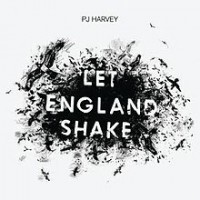
PJ Harvey
Let England Shake (2011)
Joe Pelone
PJ Harvey has been on a hot streak since she returned in 2007 with White Chalk. Let England Shake, her third album in four years, is arguably the best of her new work, taking experimental approaches to conventional styles. Clearly, she is the Christopher Nolan of rock ân' roll. Overall, the record is anti-war lyrically, ethereal in a folk/shoegaze fashion musically, and haunting all around. Over shimmering autoharp and hazy production, England buries deep and stays there.
England draws a lot of imagery from World War I, but in a way that could be applied to any war scenario. In war, nations glorify their soil, but as "The Glorious Land" points out, such prizes are soon ruined: "What is the glorious fruit of our land? / Its fruit is deformed children." "On Battleship Hill" talks about how land can, in turn, ruin wars. The song is almost a battle from WWI involving Australian and New Zealand armies that got bloody and bungled thanks to rough terrain. As an American, I'd compare it to Vietnam.
Still, WWI works because it is remembered as such a demoralizing war, "The war to end all wars." It ruined the winning nations economically; set Germany on the path to Hitler, genocide and World War II; and took so many years and lives to resolve that it temporarily killed any desire for fighting. That said, the album's standout track, "The Words That Maketh Murder" hits hard with lines that should apply to anyone. The lyric that's been quoted most frequently from England in articles, and with good reason, comes from this song: "I've seen soldiers fall like lumps of meat." That line is so visceral, so unavoidably direct and frightening. That the song is driven by a propulsive folk/bluegrass backbeat is almost unnerving.
"Murder" ends glibly with the quote "What if I take my problems to the United Nations" from Eddie Cochran's "Summertime Blues". It's one of several instances where Harvey quotes, references and samples other works. Each one is more out of artistic need than plagiarism, although I'm not entirely sure what significance the Police's "The Bed's Too Big Without You" should hold.
Those looking for a return to Harvey's heavy guitar days will again be disappointed. But then, it's been a long time since 1993's Rid of Me, and her work here is just as intense as "Rid of Me" or "Rub âtil It Bleeds." On White Chalk, Harvey opted to write for piano so as to see if it would alter her songwriting process. She applied the same trick to England, composing songs on autoharp and saxophone simply because she had never done that before. It's such a small shift, yet it resulted in a huge, rewarding departure. Hell, she even wrote a reggae tune ("Written on the Forehead"), and it's amazing. In a year that's already seen plenty of stellar releases, Let England Shake is tops.